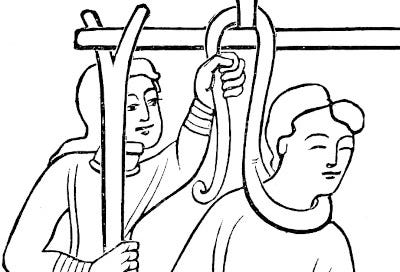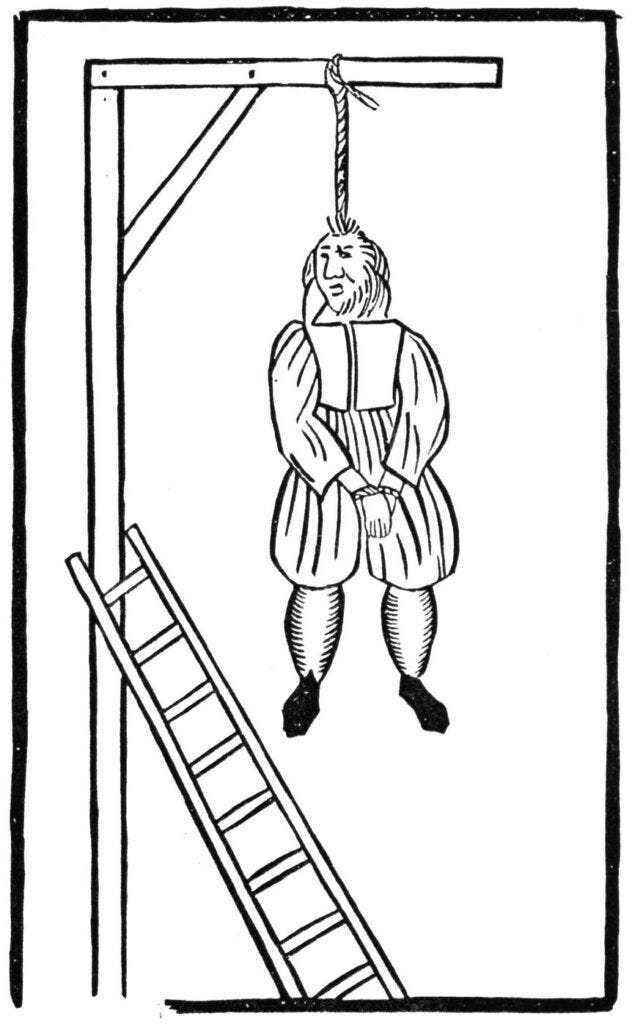Education can save your life – the story of the Neck Verse
How learning a little Latin helped medieval criminals escape the noose
The third in a series of highlights from my Learning Through the Ages blog (historyofeducation.net).
One testament to the power of education is that many people credit it with having ‘saved their life’. But whether that’s because knowledge and learning opened up a path to a rewarding career or because it helped someone escape difficult personal circumstances, ‘education saved my life’ is usually meant metaphorically. In medieval England, however, it was literal. Having an education – or at least being able to pretend you had one – really could keep the Grim Reaper at bay.
To understand how, we need to know a little about the medieval concept of ‘benefits of clergy’. In the Middle Ages, Church had ultimate authority over State, and clerics, as agents of God, were free men who were above secular laws. In practice this meant they had the right to be tried in an ecclesiastical court where they were likely to be treated more leniently than in a secular court. (I’ll be writing in an upcoming post about the role that abuses of these benefits played in stoking tensions between town and gown in the early universities.)
A person accused of a crime, even quite a serious one such as murder, could attempt to evade justice by proving their membership of the clergy. At first this involved appearing in court in tonsure and clerical dress, at a time when fancy dress was not an affordable option for many. From the fourteenth century however this began to be superceded by a reading test. (1)
Specifically, a test of the ability to read Latin, which was the mark of an educated person at this time. Since medieval education’s purpose was to prepare young men for a life in the Church, this meant teaching them Latin, the language of scripture.
Access to this type of education was tightly restricted. There were only a few hundred grammar schools in England and any new ones required a license from a bishop. The vocational aspect was taken seriously and parents could be fined for sending children to school without permission.
In a largely illiterate society, the upshot was that if you could read Latin then you were deemed to be in clerical orders and could claim the benefits due to you. Teaching prisoners to read so that they could pass the test was an offence, and in 1383 the Vicar of Round Church in Canterbury was tried for instructing the ‘unlearned’ William Gore for that reason. (1)
The reading test was used for several centuries, became part of English Common Law and even survived the Reformation (2), with the privilege being extended to women in 1629. (3) Over time, an Old Testament verse from Psalm 51 came to be the standard text used:
“Miserere mei Deus secundum misericordiam tuam iuxta multitudinem miserationum tuarum dele iniquitates meas.”
Or in English:
“Have mercy on me, O God, according to your steadfast love; according to your abundant mercy blot out my transgressions”
Why this extract in particular? Perhaps because its sentiment was particularly fitting for the circumstances in which it was used.
The historian Gerald Howson described how the test was typically applied in court:
“…when a man was pronounced guilty of a capital felony, the judge asked him ‘Have you anything to say why the sentence of the Court should not be passed upon you?’ at which the prisoner would ‘seek the Book’ – that is, plead Benefit of Clergy. He was then given a Bible and told to read verse I of Psalm 51… The judge asked ‘Legit aut non legit?’ (‘Does he read or not?’), the Chaplain would reply ‘Legit ut clericus’ (‘He reads like a clerk’), and the prisoner was whipped or fined instead of hanged.” (4)
The use of a very specific test for something very broad reminds me of a story my dad tells about learning to drive as a young man living in an Australian bush town. For his driving test, the policeman conducting the test checked his eyesight by directing him to read a number plate some distance away. The number plate in question happened to be nailed to a tree rather than a car, and never changed. So failing vision was no obstacle to anyone passing the test as they could simply visit the tree ahead of the test and memorise the number plate.
So it was with the medieval reading test. Accused laymen who lacked the requisite familiarity with Latin could attempt to cheat the test by learning the verse in question. Hence Psalm 51 became known as the ‘neck verse’ – because it could save your neck from the noose.
The neck verse does appear to have been invoked with great frequency. For example, between 1612 and 1614, 204 men were sentenced to death in Middlesex for a first offence and 95 of them successfully pleaded benefit of clergy. It’s not recorded how many of these could genuinely read Latin. (5)
Use of the neck verse to cheat the law is widely acknowledged in the literature of the time, including mentions in King Lear and Marlowe’s Jew of Malta, and a popular saying was:
“If they could not read their neck verse at the sessions, they must sing it at the gallows.” (1)
Nevertheless, it’s hard to tell how seriously the neck verse was taken by the courts. Maybe it was a charade that everyone went along with knowingly. Maybe it was used to give criminals a warning rather than the ultimate punishment. Or maybe, as Howson suggests, criminals were reprieved in return for becoming informants. One would imagine that if there had been serious concerns about its abuse, those could have easily been addressed by barring the use of Psalm 51 in the test. Whatever the case, the neck verse was a card that could only be played once. To ensure that an offender could not use it to escape death twice, he was branded on the thumb, with an M for murder or a T for theft.
The direct vocational link between education and a career in the Church was severed with the Reformation, so it’s remarkable that the neck verse continued to be used for several further centuries. The reading test was finally ended by Queen Anne in 1705, with benefits of clergy following in 1827. (3)
In a harsh age when only a tiny minority were lucky enough to have an education, memorising the neck verse was an understandable pragmatic move for people who were accused of crimes. In modern day Britain, we have mass education and thankfully the noose is no longer a threat. Sadly though the spirit of the neck verse is still with us, in forms such as English literature students reading pass notes rather than studying the text, widespread teaching to the test and the pervasive idea that we should only learn what is useful to us.
Bibliography
Benefit of Clergy – A Legal Anomaly by Newman F. Baker (Kentucky Law Journal, Vol 15 issue 2, 1927). Available online.
Redefining benefit of clergy during the English Reformation: Royal prerogative, mercy, and the state, a thesis by Lesley Skousen (University of Wisconsin, 2008). Available online.
Britannica entry on Capital Punishment
Thief-Taker General: Jonathan Wild and the Emergence of Crime and Corruption as a Way of Life in Eighteenth-Century England by Gerald Howson (Hutchinson, 1970, p31). Available on Amazon.
A Social History of Education in England by John Lawson and Harold Silver (Methuen & Co Ltd, 1973). Available via Amazon.





